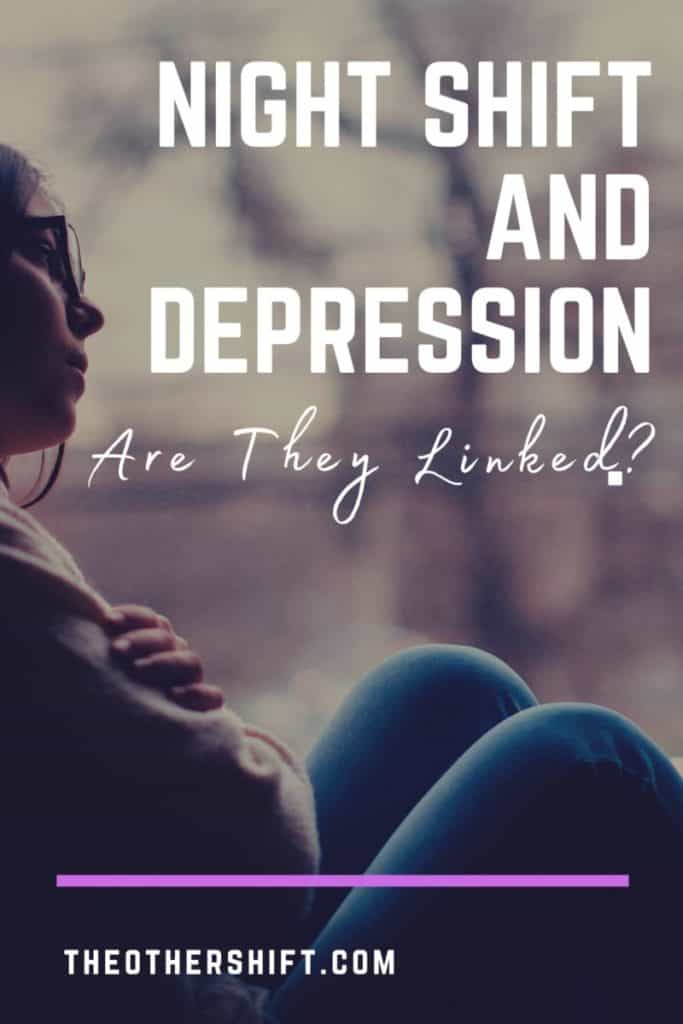Disclosure: This page may contain affiliate links, meaning we receive a commission if you decide to make a purchase through our links, but this is at no additional cost to you. Please read our disclosure and privacy statement for more info.
Fellow shift workers, we need to have an honest discussion about night shift and depression. While some of us thrive on a night shift schedule, there are also those among us who are not exactly living their best lives on night shift.
Unfortunately, night shift and depression do appear to be linked. According to studies done around the world, night shift workers are 42% more likely to experience symptoms of depression.
There are a number of environmental factors inherent in the night shift lifestyle that can contribute to depression. So, if you are one of the over 15 million Americans who currently work nights, or rotating shifts, this article is intended to help you identify the warning signs of shift-related depression in yourself and your colleagues.
We hope that you will be able to find the support you need or help provide it here. We are, after all, one big shift working family and need look out for one another.
Night Shift and Depression. Are they Linked?
The link between depression and night shift work has been studied the world over. In 2017, a team of German researchers found that night shift workers are 42% more likely to experience depressive symptoms than their day-working counterparts (source).
The reason for the link between depression and night shift has been attributed to the effect night work has on people’s circadian rhythms.
Our circadian rhythm responds to the presence of absence of daylight. It cues our bodies to increase or decrease our body temperature, heart rate and blood pressure depending on whether we should be sleeping or awake.
Essentially, those who work night shift are out of alignment with their biological rhythm, causing what the researchers call social jetlag. And because our circadian rhythm also help dictate the timing and release of some important hormones, including melatonin, serotonin and cortisol, social jetlag can cause dysfunction in our brain chemistry, which can trigger depressive symptoms (source).
So, perhaps we can assume that those folks who seem to thrive on night shift are just built different. But what is more likely, is that they are simply employing a wide range of successful coping mechanisms that helps them offset the ways night shifts can make us feel a tad wonky.
(If you’re feeling a little wonky, here are some of the other side effects of working night shift which are thankfully often avoidable).

Signs and Symptoms of Depression
Before we start discussing the coping mechanisms you can use to help you survive night shifts with your mental health intact, we first have to make sure we are on the same page about depression. Many of us think we can spot depression in ourselves and others, but truthfully, depression expresses itself differently in everyone. So, let us begin our discussion by briefly reviewing what depression is, and some of the possible symptoms.
What is Depression?
Depression is not just about feeling down in the dumps, it is a persistence mood disorder that disrupts one’s daily life and affects a wide range of daily activities including work performance and sleep.
Officially depression is defined as a mood disorder that causes persistent symptoms that affect how you feel, think and handle daily activities (source).
To be considered depression, symptoms have to persist for longer than two weeks and should present a noticeable change in daily function.
There are, however, a few different types of depression, each with its own specific diagnosis. The most common types of depression include:
- Recurrent Depressive Disorder: this the diagnosis for depression that persists all day, nearly every day, for extended periods of time and can come and go throughout one’s life (source). This is the kind of depression shift workers who suffer depressive symptoms tend to be diagnosed with.
- Persistent Depressive Disorder: this diagnosis refers to long-haulers with depression, in other words, people who have depression symptoms for at least two years (source). This type of depression typically develops in adolescence or early adulthood and tends to get written off by individuals as “normal” so they won’t seek help.

If you have been feeling depressed for longer than you can remember, this is your sign to go talk to your doctor, you don’t have to feel this way, help is available!
- Premenstrual Dysphoric Disorder (PMDD): this diagnosis refers specifically to depression symptoms that align with a person’s menstrual cycle and is linked to the associated hormonal changes (source). While, this type of depression could not be caused by shift work, it could contribute to depressive symptoms attributed to night shift work.
- Seasonal Affective Disorder (SAD): Seasonal affective disorder occurs in people who experience mood changes following seasonal changes. These symptoms tend to show up in fall and winter months when there is less sun (source). The symptoms are caused by a resulting biochemical imbalance.
Interestingly, night shift workers can experience a modified version of this, because their work schedule impacts their biochemical balance and circadian rhythm the same way seasonal changes can.
- Perinatal Depression: (Previously known as postpartum depression). This type of depression affects people who are pregnant, or who have recently delivered and is due to hormonal and biochemical imbalances caused by pregnancy (source).
If you happen to be experiencing depression while working night shift, it is important to consult your doctor to help you determine which type of depression you are suffering from, as they can all be treated very differently.

What are the Symptoms of Depression
Depression may express itself differently from person to person and across the spectrum of depression diagnoses, but most people will experience some form of the following symptoms.
- Persistent sadness
- Feelings of hopelessness, pessimism, guilt, worthlessness, or emptiness
- Difficulty concentrating
- Difficulty sleeping
- Changes in appetite and weight gain / loss
- Impaired memory and / or decision making
- Loss of motivation to do things you enjoy
- Irritability
- Physical symptoms including: headaches, fatigue, digestive issues, cramps, etc.
- Thoughts of suicide*
- Weight loss or decreased appetite
*If you are contemplating death or suicide call the Suicide Prevention Lifeline: 1-800-283-8255.
These symptoms will express themselves to varying degrees and with different severities, but as a general rule, if you experience any of these systems and they persist for longer than two weeks, you should contact your doctor to discuss depression and your treatment options.

What Causes Depression?
In general, depression is linked to a few different biological factors, all of which can contribute to one’s depressive symptoms. These factors include:
- Biochemistry: Changes to hormone balances or brain chemistry can trigger depression. This is often a secondary expression of other underlying medical conditions. (PMDD and perinatal depression tend to fall in this category).
- Genetics: Genetic predisposition can influence the severity of depressive symptoms, and one’s predisposition to depression.
- Personality: Folks who struggle with low self-esteem or are given to pessimism are more likely to struggle with depression.
- Environmental factors: If you are exposed to situations that cause mental or physical stress regularly, you tend to be more vulnerable to depression.
If you are thinking night shift workers might be predisposed to depression due to environmental factors, you would be right. Let us review some of the specific aspects of the night shift lifestyle that can cause depressive symptoms.
- Stress: In general, some of the highest stress professions in our society are shift-oriented. We’re looking directly at those in the medical field, law enforcement, aviation and the military. So, if you happen to work in one of those fields, you may want to make sure you are equipped with coping mechanism to help reduce your risk of depression.
- Vitamin D deficiency: As with seasonal affective disorder described above, night shift workers tend to get less vitamin D naturally due to their decreased sunlight exposure, this can cause a biochemical imbalance that triggers depression.
- Shift Work Sleep Disorder: Sleep deprivation can lead to hormonal imbalances, specifically it can lead to elevated cortisol levels, which causes depression (source).
- Diet: Eating the wrong things at the wrong times can contribute to depressive symptoms. Many of us night shift workers are guilty of this.
- Isolation: Living in a different social time zone is hard because it complicates our relationships with friends and families. This adds extra stress to our lives and leaves us feeling lonely which can be a part of how our depression manifests. Certainly, it doesn’t help.
- Serotonin Deficiency: Serotonin is the happiness hormone, without it, naturally we will feel, well not happy. Chronic stress and a lack of exposure to the daylight sun can lead to serotonin deficiencies, which will contribute to depression (source).

Strategies for Coping with Depression
All this talk about depression is, well, not putting us in a great headspace. But there is good news, depression is treatable and there are a number of treatment strategies out there to help!
If you find yourself struggling with depression, it is a good idea to reach out to your support system, be that your family, friends, or spouse and let them know that you are struggling. You do not have to cope alone, so be sure to ask for the help you need.
Depression Treatments
The first thing you should do, if you notice persistent depressive symptoms is contact your general practitioner, they will be able to refer you to a psychiatrist and point you in the direction of some therapists that specialize in depression.
There are a few standard treatments for depression that your care team will likely pursue.
- Talk Therapy: Cognitive behavior therapy (CBT) is usually the first thing you will tap into on your journey through depression treatment. These licensed psychologists are experts at coping with mental health challenges and will likely help design an customize a personal therapy plan designed to make you more resilient in the face of stress and depression. (source)
Pro tip: Find a therapist that either has experience in your professional field or has taken the time to research it deeply enough to understand it. This will help you minimize the amount of time you spend explaining your lifestyle.
- Antidepressants: This type of medication will be prescribed by your doctor or psychiatrist and is particularly useful when biochemical imbalance has been identified as the cause of your depression (source).
- Healthy Lifestyle Changes: If environmental factors are the main cause of depression, making some changes to your lifestyle can help you turn the corner and cope with your depressive symptoms.
Based on this basic outline of treatment options, let us take a closer look at how one might manage depressive triggers caused by some of the environmental factors related to night shift work.
Addressing Vitamin D Deficiency
As was briefly mentioned above, folks who work night shifts are at risk of developing a Vitamin D deficiency, which can trigger depressive symptoms. This is due to the fact that night workers rarely get to spend quality time out in the sunlight, but there are a few easy fixes.
- Prioritize spending time outside during your time off: You can’t sunbathe at work anyway, so why not make the most of the fact that your time off is during daylight hours. Taking a nap outside can help you get vitamin D, just be sure to bring an eye mask and apply sunscreen!
- Take a Vitamin D supplement: Cheap, accessible and over the counter, taking a Vitamin D supplement is one effective way to ensure you aren’t Vitamin D deficient.
Related: Which Vitamins Should I Take on Night Shift?
Note: Talk to your doctor before incorporating new supplements into your routine to ensure they don’t interact badly with any prescription medications you may be taking.
- Invest in a light therapy sun lamp: Lamps like this one mimic natural light and tricks your body into producing the hormones it normally would upon exposure to sunlight (source).
My friend from Germany has had theirs since 2014, and it works like a charm to help prevent SAD, so it should work for night shift workers too!


 – Click to see via Amazon
– Click to see via AmazonCoping with Shift Work Sleep Disorder
Lack of sleep can cause your cortisol levels to increase, and since increased cortisol levels have been correlated with depressive symptoms, it could be the reason why you feel down. If you think sleep deprivation is behind your depression, getting a good night sleep could go a long way towards treating your symptoms.
We’ve written a number of blog posts designed to help you sleep better, we recommend checking them out for more exhaustive information about dealing with your exhaustion. Here are a few we think you’ll find particularly helpful:
- Shift Work Sleep Disorder (SWSD) – What Is It and How to Avoid It?
- Can’t Sleep After Night Shift? 13 Weird Tips That Actually Work
- 11 Tips for Night Shift Workers Considering Melatonin
- Shift Work Bedroom Ideas: Create the Ultimate Sleeping Oasis

Make Sure You Don’t Eat Yourself into Depression
Sometimes our diet can impact our moods. After all, they say our gut is our second brain. Besides, if your tummy is constantly upset, there is a good chance you are too!
Eating the wrong things at the wrong time can contribute to the stress on your body that may trigger depressive symptoms.
Eating strategically during your night shift will help you get the energy boost when you need it and help you calm down and fall asleep when its time.
Again, our blog archives are a great resource if you find yourself in want of more shift-oriented nutritional advice. This article is a great starting point for you if you want to start eating more strategically.
Another thing to consider in terms of diet and depression is food sensitives.
Sometimes we have mild food sensitives to things like gluten or dairy and we don’t even realize it. Think of this as depression in your second brain. If you address your food sensitivity, perhaps you will alleviate a number of your depressive symptoms (source).
There are a number of food sensitivity tests on the market today, like this Everlywell Food Sensitivity Test. But you can also visit a dietician to be tested, and your insurance may cover it.
A healthy lifestyle is one of the best methods of preventing and coping with depression and food is a big piece of that puzzle.
Related post: Vegan Snacks to Satisfy Any Famished Night Shift Worker

Coping with Feelings of Isolation
One of the hazards associated with night shift work is isolation. While we may feel alone, we certainly aren’t alone in our experience of loneliness. It is well referenced among shift workers, as evidenced by the sheer number of research articles, blogs and vlogs dedicated to the topic.
Managing your shift-work loneliness is about making sure you don’t become isolated to begin with and that takes planning and intention. Sometimes it can be hard, on several occasions I’ve made plans with friends only to wind up wanting to cancel after a particularly long work week.
In these situations, you have to really check-in with yourself. If your body can’t do it, you should absolutely rest, but if you feel that way because you are slipping into a depressive mood, you have to push yourself to go interact.
You have to commit to maintaining your social relationships despite your work schedule, as your mental health will thank you for it in the long run.

Addressing a Serotonin Deficiency
At risk of being repetitive, serotonin is another one of those hormones that your body naturally produces when you bask in the light of day. But, as a night worker, you are particularly at risk for developing a serotonin deficiency, which could trigger depression.
Exercise is considered to be a form of behavioral therapy for people struggling with depression, it is also proven to help naturally increase serotonin levels (source).
Exercise might be the last thing on your mind when you’re recovering from an exhausting shift, but making sure to include 20 – 40 minutes of light exercise in your routine, just three times a week, has been proven to reduce depressive symptoms (source).
As shift workers, it can be a daunting task to find the time to go to the gym, so why not consider working out from home! This article from our archive presents you with some creative ways to start an at-home fitness routine.
Consider Shift Changes
If you truly believe that your night shift is contributing to your depression, consider changing your shift. We know that isn’t always possible to choose your shift, especially in professions where your schedule is completely determined by your operational seniority (Junior Flight Attendants, we’re looking at you).
But if you don’t think you can survive another night shift, it might be time to speak with your manager about possible schedule changes that will allow you to revert to a more “normal” work schedule.
At the end of the day, you’re nothing without your mental health and you need to do what’s necessary to make sure you are happy, healthy and thriving.

Depression vs. Burnout
We’ve talked a lot about depression here, but what if you aren’t suffering from depression at all? It is entirely possible you aren’t depressed and instead, are just burnt out.
Burnout is pretty common among those working a rotating roster, especially night shift workers and it expresses itself in ways that feel and sound a lot like depression (source). In other words, many of the symptoms are the same or similar. Including:
- Irritability
- Fatigue
- Feelings of hopelessness, pointlessness and pessimism
So how do you know if you are burnt out or depressed? In general, burnout impacts your work life, whereas depression impacts your whole life. For instance, you may lose interest in work, but maintain interest in your hobbies.
If you are still having trouble attributing your symptoms to either depression or burnout there are free online tests you can take that may help you think-through the two disorders.
This test will check you for symptoms of burnout, while this test will check you for symptoms of depression. However, ultimately a talk with a psychologist is in order, because they will only be able to accurately assess your condition by talking with you.
Coping with Burnout
It is a good idea to take steps to help cope with burnout if you do find yourself struggling with it because left undealt with, burnout can be a gateway to depression.
Coping with burnout is about re-establishing your work-life balance and trying to rediscover joy and / or meaning in the work you do. We could (& have) dedicate an entire article to shift work burnout syndrome, but to get you started here are three ways to cope with burnout and prevent it.
- Relating to coworkers: Being able to bond with coworkers will help work feel less like a chore, it also creates a sense of solidarity and connection that is linked to higher job satisfaction.
- Find the humor in it: Being able to find humor in tough situations is foundational to a resilient approach to life. (Check out our shift work memes if you need to laugh right now).
- Defend your free time: Did you volunteer as tribute to save someone from mandatory overtime. Did you get guilted into picking up an extra 3-day trip from the trade board? If you are willingly overextending yourself, stop it right now!
If you are worried about burnout we recommend checking out our more extensive article on the subject.

Finding Support for Depression
Finding support when you experience depression while deep inside what we might call the “night shift time zone” can be tricky, because most of your local therapists and psychiatrists are not working in periods that suit you.
If you need help, the US Substance Abuse and Mental Health Services Administration offers a 24/7 referral hotline service that can get you in touch with the help you need.
Beyond that, there are a few other resources you may be able to tap into for support.
Work Group Help Hotlines and Professional Support Groups
Sometimes simply talking to a peer about work can help lift a weight off your shoulder.
Some high-stress professions offer peer-staffed hotlines that you can call into when you just need to talk about something that’s been bothering you. This type of support can be very cathartic. If you can’t find these resources online through an employee portal, contact your human resources department to see if your employer offers a similar service.
If a peer hotline does not exist, do not fret, group therapy exists for just about every kind of group you can imagine. Sometimes a quick Facebook search will reveal a number of support groups that belong to your individual profession and will have plenty of people that can relate to how your feeling.

Final Thoughts: Night Shift and Depression. Are They Linked?
Depression is a sobering topic to discuss, but mental health is important especially for night shift workers who are constantly having to beat the odds and fight their biological programming.
If you are feeling depressed in the midst of your night shift, do not despair, there are so many wonderful treatment options and supports in place to help you survive, and hopefully learn to thrive on your night shift schedule.

Disclosure: This page may contain affiliate links, meaning we receive a commission if you decide to make a purchase through our links, but this is at no additional cost to you. Please read our disclosure and privacy statement for more info.
Sources
- Angerer, Peter, Renate Schmook, Irina Elfantel, et.al. “Night Work and the Risk of Depression: A Systematic Review.” Deutsches Ärzteblatt Internaitonal Vol. 114, no. 24 (Jul. 2017), 404-411. Web.
- Price, Michael. “The risks of night work.” American Psychological Association Vol. 42, no. 1 (Jan. 2011). Web.
- Schimelpfenig, Nancy. “The Role of Cortisol in Depression.” Very Well Mind. Edited by Steven Gans, MD. Dec. 11, 2020. Web.
- American Psychiatric Association. “What is Depression?” Depression. Web.
- American Psychiatric Association. “Seasonal Affective Disorder (SAD).” Depression. Web.
- National Institute of Mental Health. “Depression Basics.” Mental Health Information. Web.
- World Health Organization. “Depression.” Fact Sheets. Jan. 30, 2020. Web.
- Villines, Zawn. “Serotonin deficiency: Symptoms and treatment.” Medical News Today. Edited by: Marney A. White, MS, PhD. Jul. 12, 2020. Web.
- Villines, Zawn. “10 Serotonin Deficiency Symptoms Everyone Should Look Out For.” Good Therapy. Feb. 25, 2019. Web.
- Wisetborisut, Angkurawaranon, et.al. “Shift work and burnout among health care workers.” Occupational Med. Vol. 64, no. 4, (2014). Web.
- Substance Abuse and Mental Health Services Administration. “National Helpline.” US Department of Health and Human Services. Web.
- Santos-Longhurst, Adrienne. “Do Sun Lamps Really Lift Your Spirits and Treat Seasonal Affective Disorder?” Healthline. Edited by: Deborah Weatherspoon, PhD, R.N. Mar. 8, 2019. Web.
- Borchard, Therese. “Could Depression Be an Allergic Reaction?” Everyday Health. Jun. 3, 2015. Web.
- Craft, Lynette, and Frank Perna. “The Benefits of Exercise for the Clinically Depressed.” Primary Care Companion vol. 6, no. 3. (2004). Web.
- MacKay, Jory. “How to deal with burnout: Signs, symptoms, and strategies for getting you back on track after burning out.” Rescue Time. Jan. 29, 2020. Web.
Recent Posts
An examination of the night shift professions, that while sometimes underappreciated, are necessary for civilization, in its current form, to exist. A city can be thought of as a machine. Each...
Culminated from an exhaustive yet well-funded journey into the night, this article will prepare you for life outside of work while being a denizen of the dark. During days off, night shift...

